Why are people living on the streets in Vienna? Will no one help them, or won’t they allow anyone to help them? A year with Günter.
“The cramps come at night. They burn like fire. Pain in my arms. Pain in my legs. I can’t breathe. That’s the worst part. I search the sky for the Evening Star. Once I’ve found it, I hold on tight. I pray that God will release me from suffering. More than anything, I’d like to go up to heaven. To Mother. She died of cancer. The pain made her scream day and night. I wish I was gone from here already, too. When the cramps come, I have to stand up. That’s what the doctor told me. Straighten out my arms and legs. Breathe. I’ve still got some cigarette butts and newspaper for the tobacco. I like the taste of the ink. I don’t know why. It prickles in my lungs and stomach. Anyway, it doesn’t matter. I have to go.”
Winter
Günter Josef Lechner lives by the Danube Canal in Vienna – in a copse not far from the stall that sells horsemeat loaf. In winter he spends a lot of time lying down. He’s dozing on a bench, wrapped up in a blanket. A beard covers most of his face. A long scar adorns his nose. Nothing else of him is visible. His shoes are placed neatly under his sleeping place; a crutch peeps out, a suitcase, plastic bags and paper. He lights a cigarette. “Hi there,” he says in a gravelly voice. He takes a familiar tone with everyone. Günter often laughs to himself after finishing a sentence. When he has visitors, he invites them to sit on a tree stump an arm’s length away. Günter is 59 years old and has been living on the streets for five years. He comes from Enzenreith am Schrammelteich, a small municipality in Lower Austria. He used to enjoy making things and building model ships. He talks enthusiastically about the Titanic, and about how he used tweezers to install the little lamps in its interior. He pulled his teeth out with pliers. “I’ve only got one left.” The new year is not yet three weeks old. The thermometer is displaying -10°C. Günter says he’s not cold.
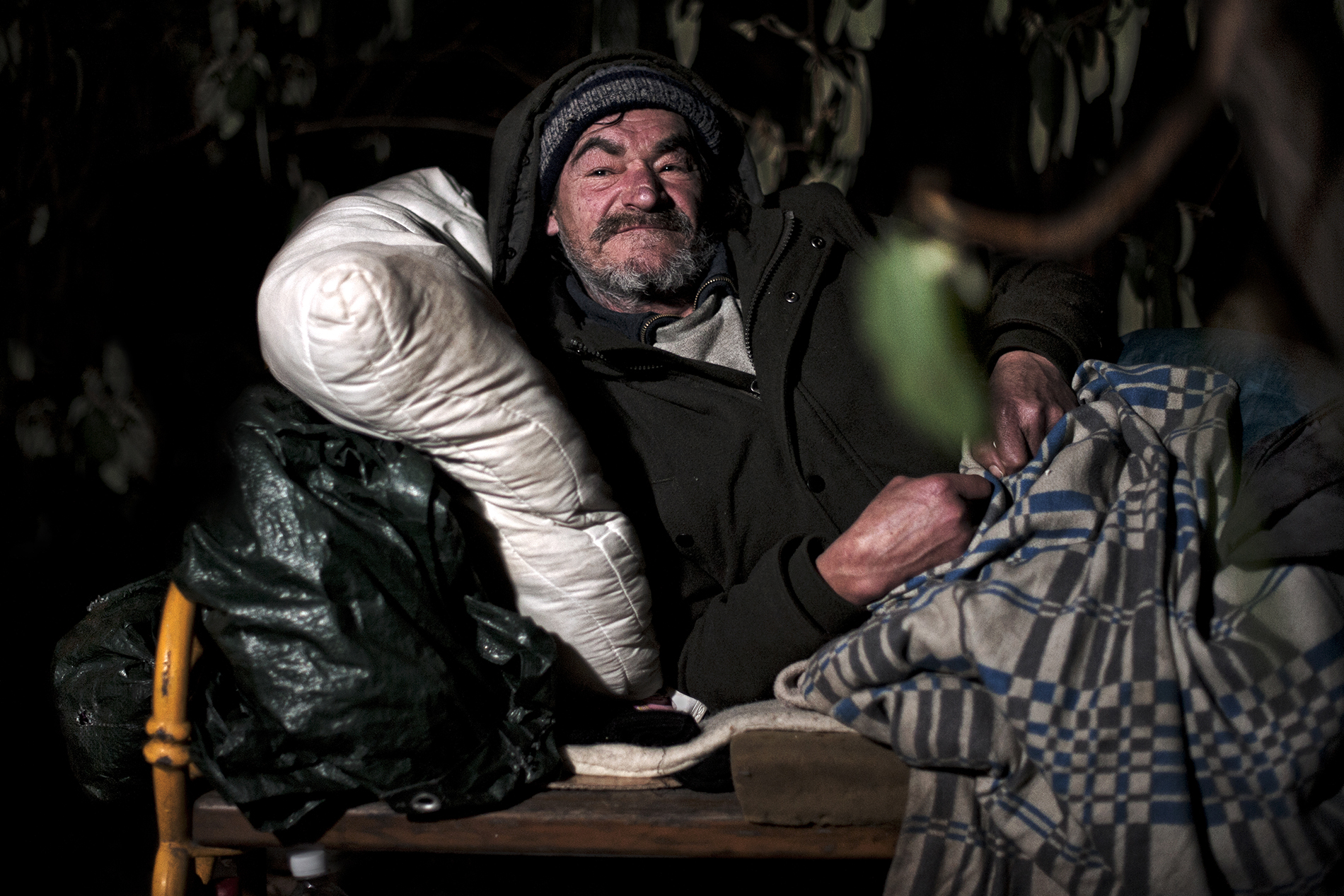
Günter Josef Lechner in January 2017 on his bench by the Danube Canal. Photo: © Nina Strasser
No one knows exactly how many people are living on the streets in Vienna. In winter 2016/2017, the emergency shelters have around 1,100 beds available. The Vienna Social Fund says they are mostly always full. When notified by passers-by, the charity Caritas sends its minibuses to pick up homeless people. Some climb aboard gratefully, while others won’t even accept a sleeping bag. They know Günter. Up until autumn, he regularly visited the Gruft, an aid centre in Vienna run by Caritas. Up to 400 people can eat there for free every day, and there are bunk beds for around 70 homeless people. Günter did laundry for other people, cleaned windows and liked to cook. He would always leave when dusk fell: “I can’t stand being around that many people.” Then he also stopped coming during the day. When social workers find him at the Danube Canal in January, he only accepts the hot soup they offer. Going with them is out of the question: “I like being in nature.” Günter likes to sugar-coat his world. In a pinch, alcohol helps.
Günter begins every conversation with the most pressing of his problems. In winter, that’s always the rats. They scurry out of four holes – one at each point of the compass. Günter’s park bench is the point where their narrow, well-beaten paths cross. The big rats aren’t so bad, he says: “Only the small ones bite.” They snatch every morsel they can find, even if he’s holding the pizza close to his body. His friend the fox often visits at night. The beaver is a rarer sight. Günter is always unhappy when it gnaws at his tree. During the day, a robin that Günter affectionately calls Zwetschgerl flits by. Even humans wander past: women who pee in the bushes, now and again an amorous couple, and “the police are here a lot.” Drug dealers skulk around close to Günter’s sleeping place. One of these young men gives Günter cigarettes and the occasional euro. He’s here illegally and isn’t allowed to work. But business is booming: he says he can easily afford a flat. The dealer can’t understand why, in a country as rich as Austria, an old man is sleeping rough.
Homeless in Vienna
The Austrian Umbrella Organisation for Organisations Working With the Homeless (BAWO) estimated that there were around 6,000 homeless people in Vienna at the end of 2017. This figure is based on the number of people who spent at least one night in an emergency shelter or social facility.
However, those who did not make use of these services are not included in the statistics. According to the Vienna Social Fund, 4,640 applications were filed at its Advisory Centre for Homeless Assistance in 2016. Of those, 780 were from families.
Sometimes Günter has enough money to pay for a night in a hotel. He mostly does it so that he can shower; he’s embarrassed when he smells. Booking a room is very difficult because he doesn’t have any form of ID. He was robbed several weeks ago and the thief stole all his documents. A social worker from Caritas convinced him to tackle the problem. That means dealing with paperwork and going to the administrative offices that Günter hates so much. Outreach workers will accompany him, “but I’m the one who has to force myself to go.” To get the duplicates, he needs cash. The social welfare office has advanced him about €840 in minimum benefit. He spends €3 on insoles and €4 on a pair of reading glasses. Then he buys back a few pieces of his identity from the pawn shop in Wiener Neustadt: his old watch, his signet ring, his gold chain with a “G” pendant. He walks the 50 kilometres back to his bench by the Danube Canal. His mood is temporarily upbeat. “I don’t have my ID yet, though.”
As winter slowly draws to an end, the fox stops visiting, the rats fall pregnant, and the robin is nowhere to be seen. And then Günter also disappears. His blankets and coat hooks hang on the branches for two weeks, then the rubbish collectors take them away.
Spring
Early every morning, Günter sits on his favourite bench on Gaußplatz, where Vienna’s 2nd and 20th districts meet. He’s waiting for the public toilet to be cleaned. On some mornings, it’s strewn with needles, on others there is a person inside. Günter drinks instant coffee out of a plastic bottle. It’s cold, black and unsweetened. He smokes newspaper cigarettes and reads a free magazine. He listens to Radio Niederösterreich, his favourite station. A burglar gave him the radio, he says. Crows sit high above him, and “Shackle-Feet” – his nickname for a pigeon that has wire wrapped around its legs – sits next to him. Every day, a naked women waves to him from her window. A man walks by at the same time every day with an unlit cigarette hanging from his mouth. Günter knows every dog that gets taken for walks in the neighbourhood: “But the Chow-Chow is my favourite.” Card players gather around the tables, children fill the playgrounds. This is where Günter spends his nights in the spring.
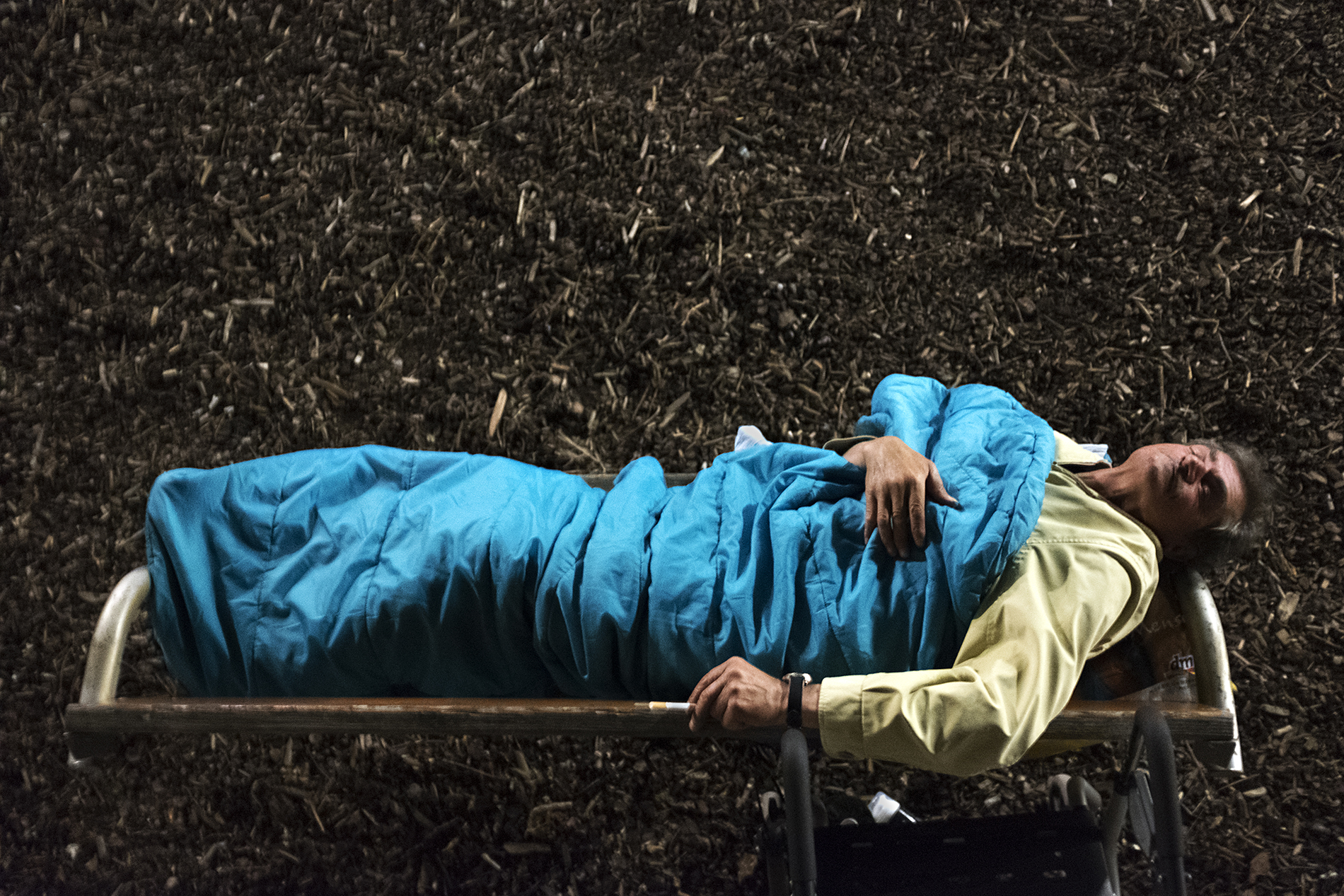
“The cramps come at night.” Photo: © Nina Strasser
He doesn’t dare go back to the Danube Canal. Not after such a terrible experience. It was night and he didn’t hear anything. He didn’t see the blow coming, he says: “My hand got the worst of it.” His head also took a knock. The man stole one of Günter’s bags, but he didn’t notice the gold jewellery. The woman who found Günter called an ambulance right away. He only stayed in hospital for a short while, then he moved into a hotel that gave him a room despite his lack of ID. It cost him €75 per day, so the money was soon gone. Then he went to Gaußplatz and slept freezing on the bench, night after night. By the time the outreach workers find him, he is almost dead from pneumonia. Now he’s back in hospital and will receive his ID while he’s there. An employee from the Vienna Social Fund is submitting an application for fixed accommodation on his behalf. Günter doesn’t want to go into a home: “They’re full of foreigners and nothing but trouble.” Nevertheless, he is starting to hope that he will be allocated a room. He can’t stay in the hospital. He has to go back out into the freezing cold. His legs barely have the strength to carry him. So he hobbles to Gaußplatz with the help of a rollator.
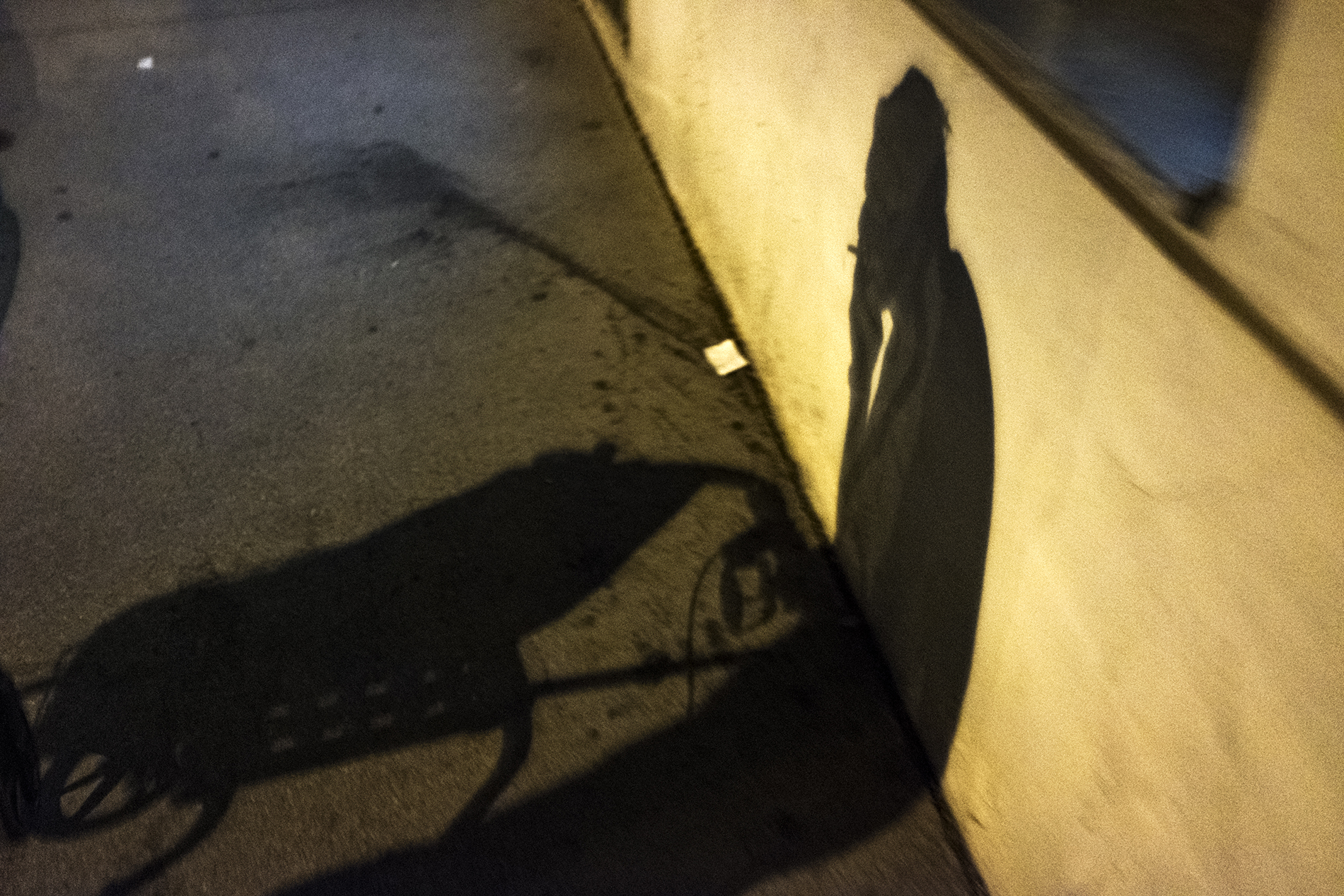
“I have to go.” Photo: © Nina Strasser
Günter’s last address was in Mattersburg, where he lived with a woman. He says that she cheated on him, so he left town: “I didn’t care where. As long as it was far away.” But he only made it as far as Vienna. From then on, he lived on the streets, with no job and hardly any money. His friends still called him, until someone stole his phone. Günter did visit Public Employment Service Austria, “but they wanted far too much from me.” That meant he didn’t receive any money. The City of Vienna couldn’t do anything for him – the state where your main address was last registered is responsible for you. In Günter’s case, that’s Burgenland. Caritas looks after people who have no money and are not entitled to any. Although it keeps him alive, it doesn’t mean he has a place to live. To receive social welfare and be allocated accommodation in the city, you have to have Austrian nationality or Austrian status. However, you also have to prove that Vienna is your main place of residence. Günter has been living here for five years and has been registered at the Gruft for two. It is up to the officials to decide what to grant him. Günter’s mood changes depending on the weather. Then he’s robbed again: “I was sorry to lose the chain.”
Who counts as homeless?
Austria distinguishes between various types of homelessness: Obdachlosigkeit refers to people who live on the streets or in public places. Wohnungslosigkeit refers to people who live in temporary facilities, such as transitional hostels, refuges or organised accommodation.
Ungesichertes Wohnen applies to people who are at risk of losing their home, and to homeless people who are temporarily staying with friends or relatives. Ungenügendes Wohnen applies to people who are living in inadequate housing, such as squatters.
Günter wishes he had a place to live: “It should cost 200 euros and be around here.” Roughly 35,000 flats are standing empty in Vienna; one of them is around the corner from Gaußplatz, on the ground floor. Günter looks through the dirty windowpane every day. The floor has been ripped out, cables dangle from the ceiling. When he asks the estate agent about it, he is told that he wouldn’t be able to afford the rent. “I don’t care about money anyway,” says Günter. He’s now receiving support from Public Employment Service Austria – his claim has not yet lapsed. The social welfare office has accepted him as a Vienna resident, so the additional payment means that he now receives about €840 – the same amount as the minimum benefit. He likes buying women roses or a drink or two. He’s determined to save up for an airbed. And he’s found a shop selling a model of the Titanic. Spring is starting to give way to summer when the Vienna Social Fund approves Günter’s application for funding for services from the Viennese Assistance Programme for Homeless Persons. To celebrate, he cracks open a beer in the park. He just has to go and pick up the money at the post office and then enjoy his last night under the stars.
But the next day he doesn’t move into the room that’s been reserved for him. He sleeps on the park bench and coughs up phlegm. The money’s gone, he says. Stolen. “She had beautiful blue eyes.” He scans the sky for the Evening Star. “I wish I was gone from here already.”
“Four in the morning is the best time. Everyone’s leaving the nightclubs in the first district. They’re all drunk and money just falls out of their pockets. I don’t beg. I’d love to know how they built St. Stephen’s Cathedral. There’s a place that sells pizza on Schwedenplatz. They throw away anything they don’t sell. I take the pizza out of the rubbish bins. I don’t care. It tastes better than the soup they give out at Praterstern. Only the lentil soup is edible – it tastes of more than just salt and pepper. The Prater is the best place to find things. One of the stall owners wraps the sausages in foil before he throws them in the bin. The badger usually gets there first. It does the same round as I do. I’ve found lots of things in the fountain. Tourists go crazy for throwing coins in there. But just coppers that pull your trousers down when you walk. There’s always loads of things lying around along the Danube Canal. An old woman collects the empty bottles early every morning. I wouldn’t put myself through that.”
Summer
One of the transitional hostels run by the Viennese Assistance Programme for Homeless Persons is located in a narrow grey street two kilometres behind the main station. A poorhouse stood on Gänsbachergasse as early as 1887, and the City of Vienna opened the hostel at Number 7 in 1989. Some 280 people live here. A room in the basement serves as a gym. There are a few weights, but the money won’t stretch to more equipment. Residents smoke on the patio, and the garden wall is painted in bright colours. The home provides accommodation for women, couples and – on the fifth floor – single men. A glass door divides the living area from the stairwell. It always has to be locked. Every floor has showers and toilets, a common room and a kitchen. Günter’s bedroom is furnished with a single bed, a cupboard and a table. This is where he lives during the summer.
His decision to move in here was made on Gaußplatz in the rain. Sometimes even Günter is lucky. The tobacconist from the corner walked by at just the right moment and, at Günter’s request, notified the social workers at the Gruft. After stopping off to get some new clothes, he found himself sitting in reception at the hostel, listening to the many rules. “They check your room every day.” He has to pay his rent on time. His hand was shaking too hard to sign the contract. The doctor prescribed him a powder for his cramps and to calm his stomach. Günter stayed in bed and slept for almost three days straight, then he was up and about again. He’s now able to walk with just one crutch. In the kitchen on his floor, he likes to make scrambled eggs with at least eight eggs. He showers three times a day and moisturises his face with Nivea Creme after shaving. Does he want to stay? He’s not sure: “I’m happiest in nature.” He still makes his rounds at night. Sometimes he tries out a park bench.
If you have lived on the street for a long time, you have to re-learn certain things. Society has rules that can be full of pitfalls. That’s why Günter’s social worker wants to see him regularly. Günter works hard to comply with the requirements. “When I have to go to an administrative office, I get there before 7 a.m.” He sometimes has to wait for his money from the social welfare office to arrive. Maybe a form was missing somewhere, or perhaps this or that deadline passed. “I don’t understand it.” Günter is often able to buy pizza now; it’s rare that he takes one out of the rubbish. In August, he applies for early retirement. He worked his whole life. He started out in a steelworks, and spent most of his time as a coal carrier. He cleaned buildings, and he climbed high-voltage pylons until a fellow worker caught fire and fell to his death. Heavy labour earned Günter good money, and more or less ruined his lower back.
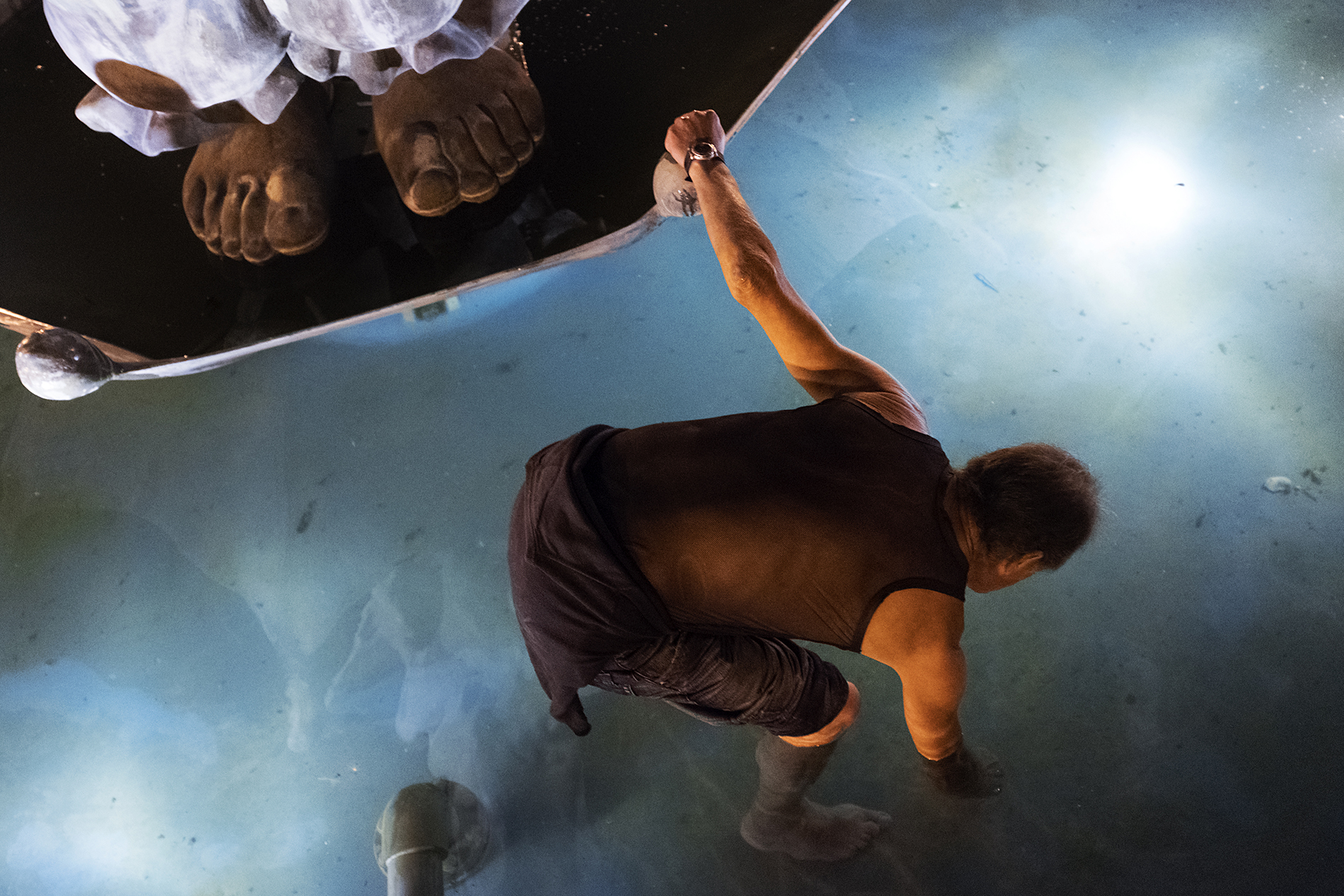
“I’ve found lots of things in the fountain.” Photo: © Nina Strasser
When Günter goes to buy the Titanic model, he takes a box from the middle of the pile, not from the top. He realises his mistake too late: his box contains the Queen Elizabeth. He says he doesn’t mind, and uses the rollator to transport the pieces to the Augarten park for painting. There, he sits at a table, takes off his shirt, and returns to his hobby. Music is playing on his radio, but “they barely ever play Elvis”. Günter likes to sugar-coat the world. While he does, he paints the individual pieces of his model ship. He wants to take a trip back to Enzenreith, his hometown. Günter had nine brothers and sisters. Seven are still alive, but he lost contact with them years ago. He often talks about his youngest sister, who he is especially fond of. He often wonders if her Angora cat is still alive. He never wonders if she might be looking for him.
Günter hopes the sun will be shining for his spontaneous visit. Almost as soon as he’s made up his mind to go, it seems to be raining all the time. And when the weather finally improves, the next disaster happens.
Autumn
The pub that lent its name to the Schrammelteich lake, where Günter looked after the boats as a teenager, is crumbling. Locals often go to the new one next door for a few glasses of red wine. Enzenreith has 1,942 residents. Günter’s family used to live between the fire station and the town hall. Everyone has moved away now, but they haven’t gone very far. Günter’s youngest sister lives in Gloggnitz, a few hundred metres away, and cares for their 93-year-old father. She has four children. Günter only knows three of them. She hasn’t heard from him in 13 years. She’s now a grandmother. Every time there was a fair nearby, she would go there and look for her brother, who ran the bumper cars at funfairs when he was a young man. When she hears that he is still alive, she cries tears of joy. She asks for his number and calls his new mobile phone. She asks him why he can’t be there with her.
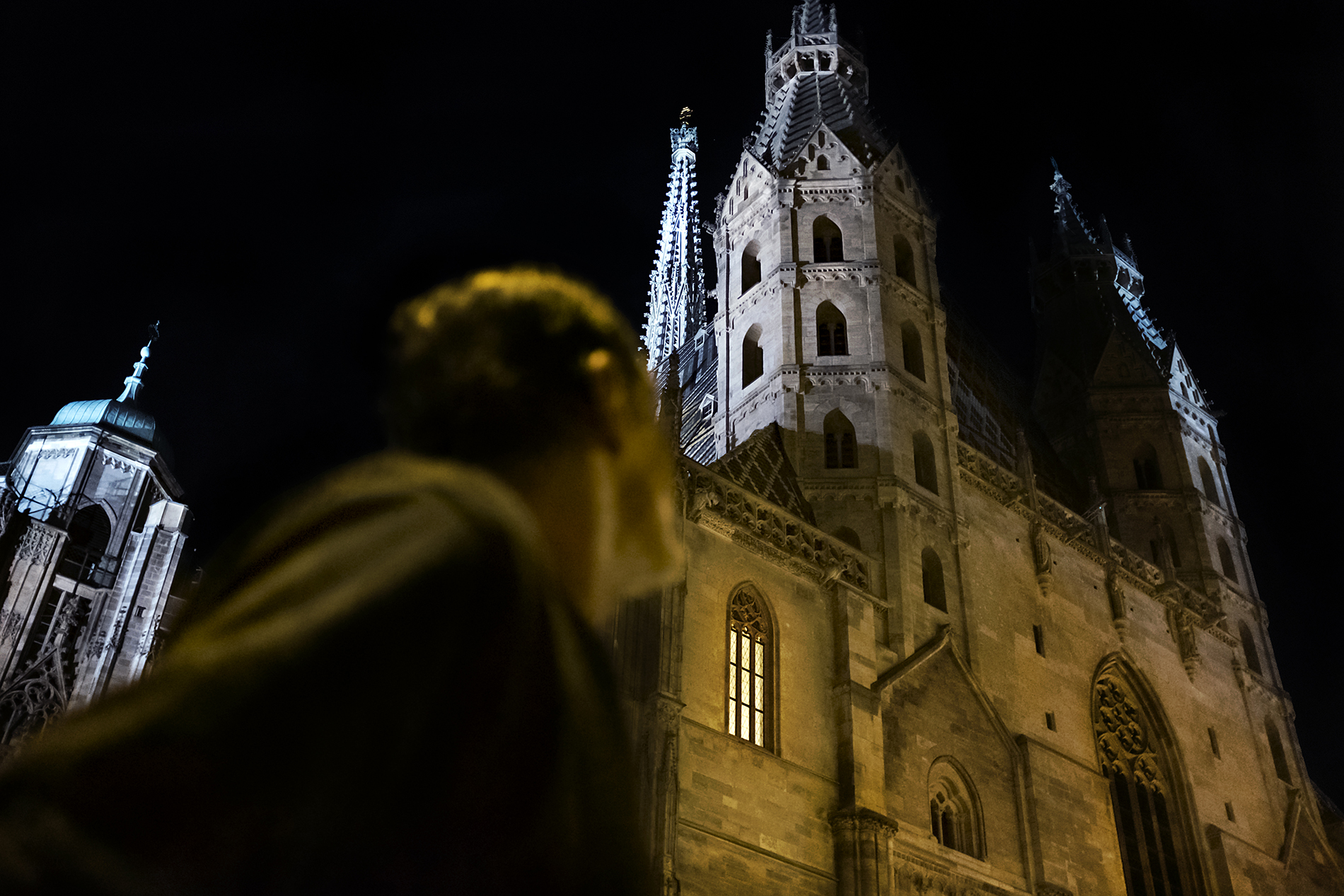
“I’d love to know how they built St. Stephen’s Cathedral.” Photo: © Nina Strasser
Before embarking on his planned trip, Günter went for a night out in Vienna. He says he got hit by a car while walking home in the early hours of the morning. The driver sped off and disappeared. Günter dragged himself home on his crutch and went to bed to sleep off the alcohol. Now, a few X-rays later, he’s cooling his badly swollen knee with ice. After talking to his sister on the phone, the accident is now also causing pain in his heart. Whenever he makes big plans it seems as if fate turns against him. His sister sends him photos from his old life via WhatsApp. He’s especially happy about one of his mother. He wants to visit her grave soon. He says he doesn’t care that his father is still alive: “He never really wanted me.” Most of his siblings stayed living in the large house for a long time. Günter was the first to move out.
How to help in Vienna
The Vienna Social Fund’s Assistance Programme for Homeless Persons has around 300 beds in night shelters and six day centres throughout the city. They are open year-round. Between 30 October 2019 and May 2020, the city will be adding an additional 870 beds and three Wärmestuben day centres, via the Vienna Social Fund. Caritas staff drive around the city in the Kältebus to distribute sleeping bags or take people to emergency shelters. The public can alert the bus drivers by calling +43 1 480 45 53 at any time of the day or night – or they can use the new app (KälteApp), available for Apple or Android. In emergencies, the police can be reached on 133, and the ambulance service on 144.
Günter can’t explain why he’s living on the street. Alcohol isn’t the problem, he says: “I don’t touch the hard stuff – just the occasional Jägermeister.” He drinks coffee every day, and then his stomach hurts. He’s overcome his fear of failure, but he can’t exactly say how. Praying helps for sure, he says. He often went to the Marienbrücke and begged the statue of the Virgin Mary, which people crossing the bridge rarely notice, for help when he couldn’t find anything to eat. Suddenly, Günter starts making plans. He wants to have teeth again – but only once he’s pulled the last one out. He wants to have surgery for his cataracts, and to remove his varicose veins. At the parliamentary election in October, Günter puts a cross by the party that “cares for animals and looks after the environment.” He’s finished the Queen Elizabeth and has started on the Titanic. As autumn draws to a close, he visits the Schrammelteich and then his family. Günter’s sister cries tears of happiness when she sees him. His father hugs him.
At the transitional hostel, some of the residents are disruptive, even though it’s against the rules at night. They knock on Günter’s door, hoping to scrounge cigarettes: “I don’t put up with that.” The man in the room next door shouts and pounds on the wall, keeping Günter awake. Another man recently threw his rubbish on a parked car and damaged it. Günter says the police suspected him for a while. He says that one of his neighbours throws up in the hallway, and that another stinks because he never washes. Trains screech past behind the building. Airplanes descend overhead “and let down their landing gear above our roof.” Günter is constantly waiting for something – an appointment, his money. His application for early retirement is rejected. But he still has to go for an X-ray. Günter takes a lot of pain killers: “I wish I was gone from here already.”
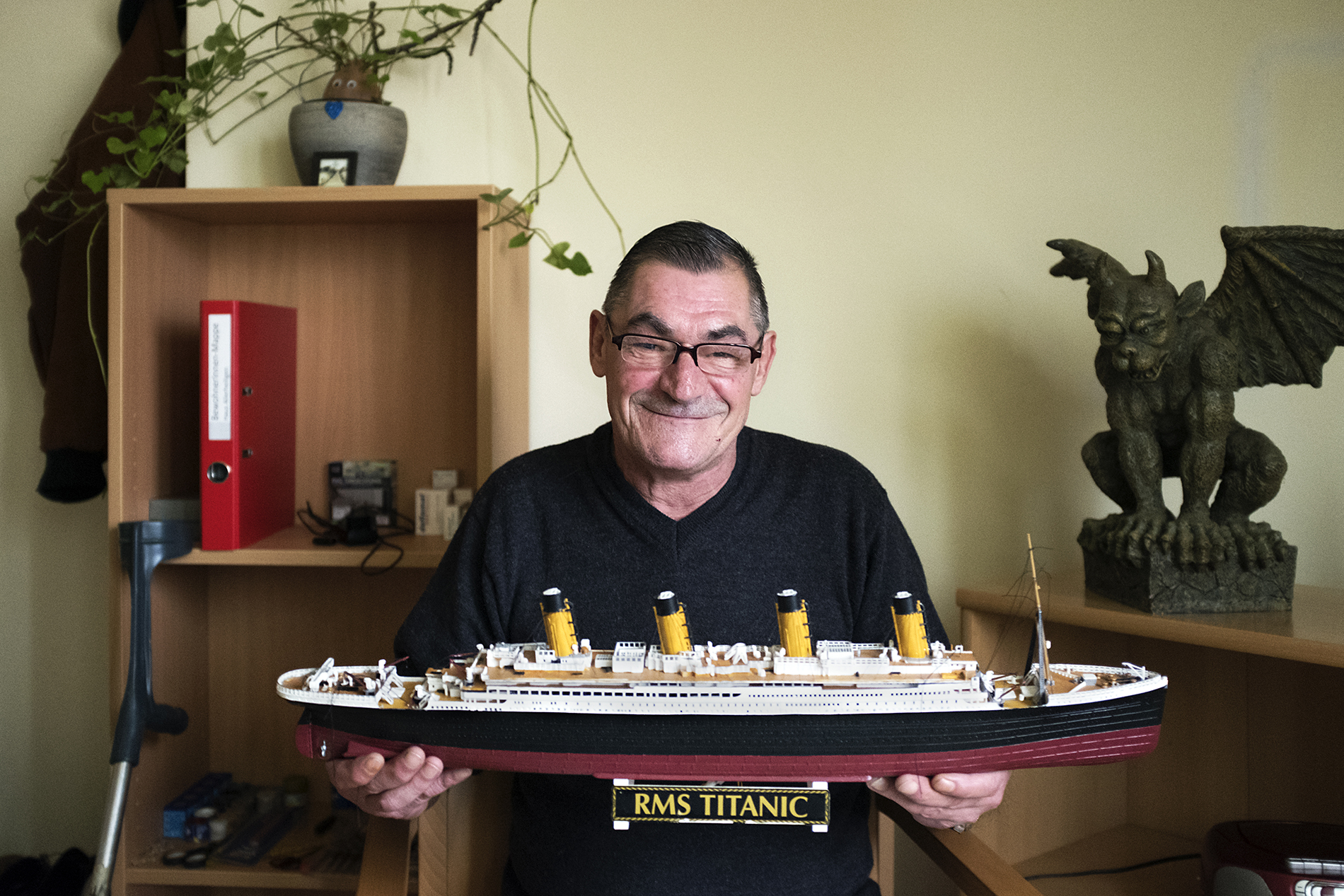
In January 2018, he is living in permanent Caritas accommodation and has built a model of the Titanic. Photo: © Nina Strasser
He allows his first chance at a permanent place to live to pass by, unused. He doesn’t make overnight decisions, he says. Then winter returns, and with it the cold. “I don’t care,” says Günter, though not so often anymore.
“I wait on Gaußplatz for the sun to rise. The sausages in the aluminium foil are still warm. Shackle-Foot is already here. The crows are still sleeping, and the people too. The woman with the Chow-Chow will appear soon. The flat is still empty. Syringes are scattered on the toilet floor again. The dealer is almost unrecognisable these days. He’s grown a beard and wears sunglasses. His nephews are the only ones who deal now. The bag is full of cigarette butts. I found four euros today. I gave the coppers to the woman who begs on the bridge. It’s supposed to be sunny today. There’s a picture of the fox in the free paper. They took it at the Danube Canal. I’d like to hang it in my flat. With the Titanic underneath.”
Original in German. First published in on 19 December 2017 in FALTER edition 51/17. This article is an adapted and longer version of the original reportage.
Translated into English by Jen Metcalf.
This text is protected by copyright: © Nina Strasser. If you are interested in republication, please contact the editorial team.
Copyright information on pictures, graphics and videos are noted directly at the illustrations. Cover picture: “I wish I was gone from here already.” Photo: © Nina Strasser
Journalism Award “from below”
The Journalism Award “from below” for respectful poverty coverage was created in 2010 as a project of the Austrian Anti Poverty Network. It is aiming to promote a kind of journalism which reflects the many facets of poverty, treats people concerned in a respectful way, allows their voices to be heard, lets their realities become visible and examines the societal causes of poverty. The prize “from below” is designed by people experiencing poverty and by journalists. The jury exclusively consists of people experiencing poverty.
Since 2015, with the support of the ERSTE Foundation and the EAPN (European Anti-Poverty Network), an international dissemination of the prize has been in progress and workshops have been organised. Most recently, the Journalism Award “from below” was presented for the first time in Hungary, Croatia, Finland and Iceland. This article by Nina Strasser was awarded in the print category in 2018.